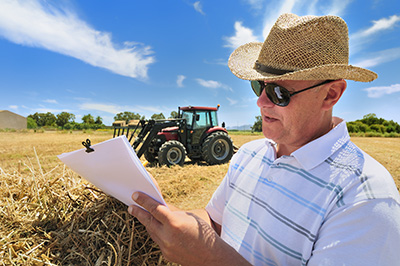 Contact
About Us
Articles
Home
Contact
About Us
Articles
Home

Farming is an essential industry in the United States, providing food for those who live in this country and around the world. Farmers need life insurance to protect both themselves and their families with living benefits, such as cash values, and death benefits for liquidity and succession planning for their heirs.
Here are some noteworthy figures from the U.S. Department of Agriculture (USDA):

All farmers know how much work they have contributed to their business and way of life over the years, so it makes sense for them to protect their assets and operations for the future. They are also keenly aware of the costs to run and maintain a farm — costs that they will want their heirs to be able to afford.
This is one area in which life insurance can help. It provides much-needed liquidity since most of a farm’s assets are tied up in the land, facilities and equipment. There isn’t usually an abundance of cash to support ongoing operating costs and other obligations, so the money from a life insurance policy could prevent the forced sale of the property to pay for them.
An irrevocable life insurance trust is often used to protect assets. For instance, if life insurance benefits are paid to an individual, the proceeds are included in the taxable estate of the decedent. But those same death benefits paid to the ILIT will not be included in the gross estate of the insured.
Although the exemption on estate taxes is slightly over $11.5 million in 2020, if a farm-based estate is larger than that, the heirs could be facing a potential estate tax obligation if the proceeds are not paid to an irrevocable trust.
Life insurance can smooth out the rough road of transition from one farming generation to the next. It makes possible an equitable distribution among heirs. The life insurance proceeds allow the farming children to buy out the farm from their non-farming brothers and sisters.
For example, the farming beneficiaries can have a land interest, while those off the farm get the same value in life insurance proceeds. By using life insurance, the family farm can be preserved for the next generation, and family discord can be avoided.
As one estate planner put it, the goal is to ensure “that the next generation is still talking to each other and willing to get together at Thanksgiving and Christmas.”
In contrast to the death benefit that pays out at death, the living benefits of life insurance can be accessed while during the lifetime. Cash value from permanent life insurance can help by providing financial protection in the form of loans against the accumulated tax-deferred cash value.
These loans are available for things like long-term care and unexpected medical expenses that might otherwise put the business in jeopardy. There are other living benefits of life insurance to consider, including a living benefit rider.
This rider provides additional coverage on the life insurance policy. A rider is especially helpful when there are specific needs that aren’t covered by a standard policy. It allows for the customization of a life insurance policy to fit those needs.
Say the insured has a terminal illness. An accelerated death benefit rider would pay out a portion of the death benefit, and the money could be used for medical or farming expenses, or anything else. Upon death, the beneficiaries receive the balance of the life insurance policy’s value.
How much life insurance a farmer needs will depend on several factors. Here are the most common of them:
Many farm families might not be able to afford the total amount of life insurance it would require to cover escalating land values over several decades. But a lesser amount of life insurance can keep the distribution of the estate equitable while ensuring that the farming business is sustainable.
To recap, here’s how life insurance can be a useful tool in estate planning:
Alliance America is an insurance and financial services company. Our financial professionals can assist you in maximizing your retirement resources and achieving your future goals. We have access to an array of products and services, all focused on helping you enjoy the retirement lifestyle you want and deserve. You can request a no-cost, no-obligation consultation by calling (833) 219-6884 today.


